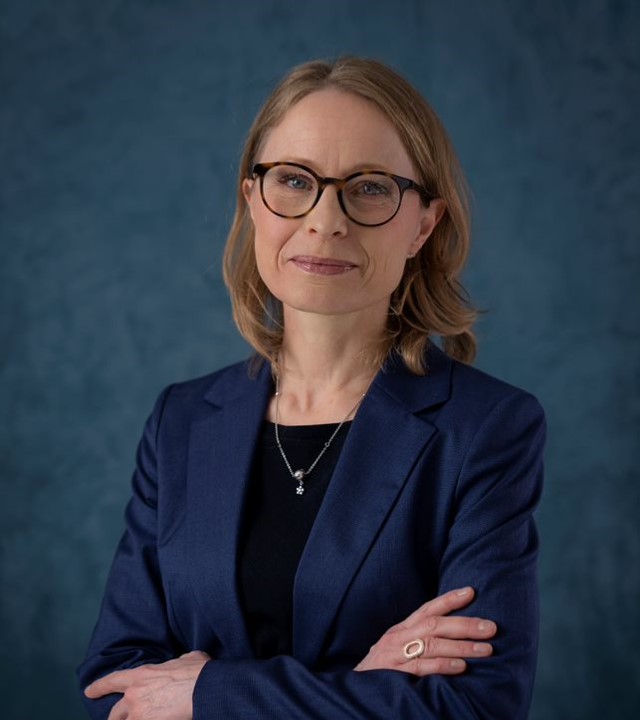
A Physician in the Industry
Karin Madsen mentors medical doctors in career paths beyond the clinic
After completing her medical education, Karin Madsen began exploring alternative career paths where she could utilize her skills outside of the hospital setting. Now, she proudly possesses an impressive 25 years of experience in the pharmaceutical industry.
Written by Terese von Knorring, PhD student at the University of Copenhagen and participant of the course “Career Skills for Scientists” during the spring term 2024
Twenty-five years ago, after receiving her degree, Karin Madsen got her first job in the pharmaceutical industry as clinical project manager.
“I felt a sense of anticlimax upon obtaining my medical degree. Working at the hospital felt lonely, and I lacked supervision, feeling inadequate. I stumbled upon a job advertisement for a position at Leo Pharma and decided to apply, despite not feeling fully qualified. My curiosity led me to take the leap, and fortunately, I secured the job.”

She has now come full circle, returning to Leo Pharma, after holding various positions in different companies along the way. Having experienced several aspects of the industry, from clinical development to medical affairs, Karin currently holds the position of Head of Medical Excellence & Operations in Global Medical Affairs at Leo Pharma.
“I’ve been very fortunate. Experienced mentors introduced me to various industry roles and provided hands-on training right from the start. I was entrusted with significant responsibilities and had the opportunity to explore many different avenues. It was the best start for my career.”
Giving back what she didn’t receive
Reflecting on her journey, Karin expresses gratitude for the supervision and mentoring she received when starting her career in the industry at Leo Pharma. During her education, she lacked someone to discuss her thoughts with.
“I had no idea what it was like to work in the industry as a medical doctor. When I started, I found role models and other physicians I could relate to, something I didn’t experience in the clinic. Looking back, I realize that having more knowledge earlier would have been immensely helpful.”
Karin now mentors medical doctors in Lægeforeningen, the professional interest organization for physicians in Denmark, offering them insight into what the medical industry can offer.
“I don’t aim to persuade anyone to work in the industry. However, I’m here to discuss with colleagues the possibilities available to medical doctors. It’s important to be aware of the type of work you enjoy and be aware of the possibilities. I want to provide what I wished I had received.”
Always consider the personal investment
Karin started her career in the industry immediately after completing her education, yet she highly recommends other doctors to undergo the mandatory one-year residency (KBU in Denmark). Additionally, she emphasizes the advantages of obtaining a PhD.
“With a PhD, you become an expert. You understand data and establish a network. You can engage in peer-to-peer dialogue, not merely by reading publications but by conducting research yourself. It also fosters personal growth. Having a PhD earns you respect and adds an extra layer of expertise.”
Completing your residency, PhD, or specializing as a doctor allows you to keep numerous doors open. However, at its essence, the most crucial aspect is ensuring self-preservation throughout the journey.
“It’s about considering the investment in relation to where you aim to go. Is it truly worth it? For me, the journey holds more significance than the destination. You must be capable of preserving yourself throughout the process and keeping your core values intact.”
Shifting attitudes towards industry transition
Karin observes a shift in attitudes towards doctors transitioning to the industry. The public perception has become more accepting of individuals moving back and forth between sectors.
“Previously, there was a stigma attached to physicians who worked in the industry. I don’t see that anymore. There’s now a great deal of understanding and interest from both sides. Public-private partnerships and the industry attract individuals from both the clinical and academic realms.”
However, prejudices and misconceptions persist.
“A common misconception is that the industry is highly performance-driven and focuses on individual achievement. In reality, collaboration within a team is essential. Humility is crucial. As a physician, you’re accustomed to making decisions, but it’s important to recognize that others may have better insights than you.”
A significant advantage that Karin sees in her job is the multitude of opportunities available and the ability to utilize various skills. The chance to travel, learn from experts, work internationally, and pursue further education. However, with privileges come responsibilities.
“The workday isn’t confined to 9 to 5, and it can be challenging to disconnect from work. Although you may not have your own patients, you still carry significant responsibility. One must be equipped with steadfast principles. There’s a profound responsibility in contributing to drug development.”
Be humble and authentic
Applying for a job in the industry can feel challenging for individuals transitioning from academia or clinical practice. Entering a new career path often entails encountering unfamiliar territory.
“Be authentic. Reflect on how you bring your own skills to play. Acknowledge what you know and express your willingness to learn. If there’s a specific area you’re interested in but lack knowledge, consider taking introductory courses to familiarize yourself with the terminology. This is also an opportunity to meet potential future colleagues.”
Discovering what motivates you is essential for finding the right job, whether it is a leadership role, a specialist position, research, or communication.
“Try to find out which assignments bring you the most joy, meaning, and flow. It is important to hold onto your own values, focusing on what is important to you and what you wish to learn more about. With openness and curiosity, you’ll go far.”

0 comments